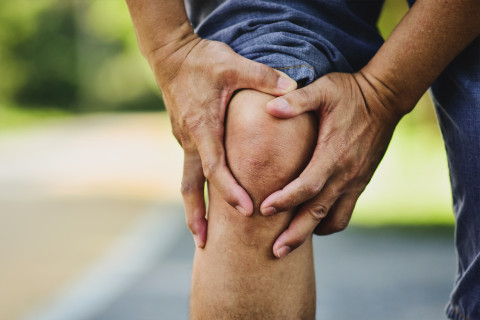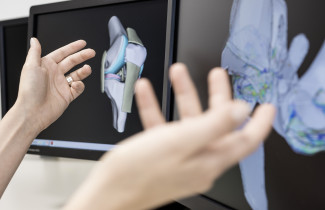MSc Amir Esrafilian’s dissertation developed different multiscale subject-specific knee joint computational modeling approaches to assess mechanical responses of knee load-bearing tissues in different functional activities such as daily activities and rehabilitation exercises.
The knee joint facilitates locomotion and provides stability, force transmission, and shock absorption for the lower extremity of the human body. Nonetheless, the high loading and the intrinsic complexity of the knee joint mechanism make the joint potentially vulnerable to injuries and degenerative musculoskeletal diseases, namely knee osteoarthritis. Hence, a thorough knowledge of the joint mechanical responses is essential in the evaluation of knee musculoskeletal disorders. In addition, the effectiveness of knee rehabilitation protocols and post-surgery joint recovery are often influenced by localized knee joint loading. Since direct measurement of knee joint loading requires invasive methods, mathematical models are widely used for simulations. Nonetheless, no feasible analysis pipelines have been introduced and utilized, for instance, to provide clinical decision-making with subject-specific in-depth joint mechanics of different activities.
MSc Amir Esrafilian’s dissertation developed different multiscale subject-specific knee joint computational modeling approaches to assess mechanical responses of knee load-bearing tissues in different functional activities such as daily activities and rehabilitation exercises. Each of the devised modeling workflows incorporated different levels of subject-specificity and complexity of the knee joint mechanism. Finally, a rapid atlas-based multiscale modeling and analysis pipeline of the knee joint was devised and utilized to investigate knee joint mechanics of individuals with knee osteoarthritis in different functional activities, and also to demonstrate subject-specific design of rehabilitation protocols.
The devised modeling approaches could provide a nested coupling at the interface between the utilized models with different spatial scales, i.e., from joint-level down to tissue-level. The findings of the dissertation revealed that assisting the simulations with the subject’s muscle activation patterns rather than using a highly complex knee model but with no information on the subject’s muscle activation patterns might improve the accuracy of the estimated joint mechanics with minimal computational cost compared to a highly complex knee model. Moreover, the knee joint mechanics in different functional activities estimated by the developed atlas-based multiscale modeling and analysis pipeline provided insights which could be adopted to design more efficient and subject-specific rehabilitation protocols as well as improved daily activity routines to optimally load or unload specific knee joint regions, for instance, to slow knee osteoarthritis progression.
To sum up, the developed workflows enable rapid modeling of the knee and the estimation of detailed subject-specific mechanical responses of knee cartilages and menisci governing initiation and progression of tissue damage (i.e., tissue degradation and adaptation), such as cell death and collagen damage. The devised workflows can be utilized for research purposes with large cohorts as well as supporting clinical decision-making with the subject-specific design of rehabilitation protocols to prevent excessive tissue loading, damage, and pain. In the future, the developed workflows may be integrated into predictive tissue degradation algorithms.
This project was financially supported by the European Union's Horizon 2020 research and innovation program under the Marie Sklodowska-Curie grant agreement No. 713645.
The doctoral dissertation of MSc Amir Esrafilian, entitled Multiscale computational modeling of the knee joint: Development, validation, and application of musculoskeletal finite element modeling methods will be examined at the Faculty of Science and Forestry on the 3rd of September in Kuopio Campus and online. The opponent in the public examination will be Professor Elena Gutierrez Farewik, KTH Royal Institute of Technology, Sweden, and the custos will be Professor Rami K. Korhonen, University of Eastern Finland. The public examination will be held in English.


